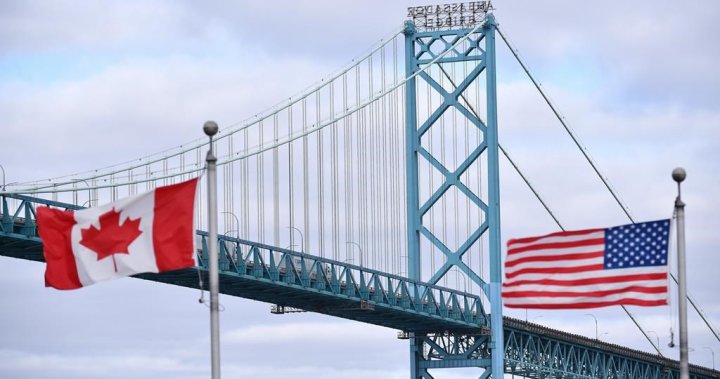Ontario’s representative to the U.S. is confident there’s a deal to be made on growing the Canada-U.S. economic relationship in a way that resolves U.S. President Donald Trump’s trade concerns, but says Canada will feel “a lot of pain” before that is achieved.
David Paterson says he’s had positive conversations with Republican lawmakers in Washington who understand America’s dependance on Canadian goods, particularly critical minerals like nickel from Ontario, and the need for a North American alliance against China and Russia.
He says underscoring those needs and finding ways to strengthen and expand them has been a key focus as Trump’s threatened tariffs on Canadian goods inches closer.
“You just can’t unscramble the eggs,” he told Mercedes Stephenson in an interview that aired Sunday on The West Block.
“You certainly can’t do that in the short term. So our proposal is, let’s make a bigger omelete: what are the things we could do together? And I think that is the pathway that will resolve this, ultimately.
“It’s really the case of finding the deal that will that will be acceptable and exciting for for the president,” Paterson continued. “And I actually believe we can get there, but I think we will feel a lot of pain beforehand, unfortunately, because I think tariffs are real.”

Trump has promised to impose 25 per cent tariffs on Canadian imports on Feb. 1, citing imbalances in trade and defence spending. The federal government’s attempts to address Trump’s concerns about border security, including enforcement and detection investments, have not convinced Trump to back down.

Get breaking National news
For news impacting Canada and around the world, sign up for breaking news alerts delivered directly to you when they happen.
Canadian officials from both Ottawa and the provinces and territories have made repeated pilgrimages to Washington to pitch enhanced partnerships on trade and energy.
Ontario Premier Doug Ford has been a top voice during the growing trade dispute, appearing in U.S. media to argue against tariffs while threatening numerous retaliatory moves, including cutting off energy exports and U.S. alcohol purchases.
Paterson said he believes the provinces have had an “easier” time making their cases to the U.S. than the federal government due to the high interest in provincial resources and the irritation Washington has with Ottawa’s handling of federal issues.
“We have our own swim lanes,” he said. “We’re responsible for electricity and for owning our natural resources, and that’s really positive and interesting.
“The federal swim lanes, they’re tough ones: immigration, borders, defence. … I think we’ve been a little negligent at the federal level for a bit of time and we need some improvement there.”
Paterson said he has held multiple meetings over several months alongside his Alberta and Quebec counterparts to stress to U.S. and state lawmakers that maintaining open trade with Canada is a net benefit to both countries.
“I have not had a bad meeting or a bad word from a Republican in the last year,” he said. “I mean, generally, people love Canada.”

Paterson has focused his conversations on Ontario’s high grade nickel exports, which he said the U.S. can’t mine domestically, and the highly integrated cross-border auto industry.
“Many, many states are really mixed together with the auto sector (and) dependent on parts from Canada,” he said.
“Having worked at General Motors (where Paterson was a top executive for 10 years), it doesn’t take many weeks before plants in the United States will shut down for lack of a part from Canada. That dependance … is just an economic fact.”
He added electricity imported from Ontario could help power the huge data centres for artificial intelligence the Trump administration is seeking to build in the U.S.
Trump has recently mused that “we don’t need” any of the top imports from Canada, including oil and gas, vehicles, lumber and dairy, arguing the U.S. can produce all those things itself.
Paterson said the argument being made is that U.S. dependance on Canadian goods can be turned into an asset through expansion and acceleration. That includes making the case that partnering with Canada will benefit U.S. national security, which has been a focus of the American side, he added.
“There is an economic logic to what is happening here that’s important to pay attention to,” he said, but “every conversation here that I’m in begins and ends with national security.”
Paterson said it will be important for the federal government to do more to address the U.S. administration’s concerns in a way that matches the provinces.
“We’ll work together with whoever is the next prime minister to try and make sure that we can put the things on the table that will get us through (the tariffs to a deal), and we will get through,” he said. “But we’re going to need to be a little bit more aggressive.”
© 2025 Global News, a division of Corus Entertainment Inc.




